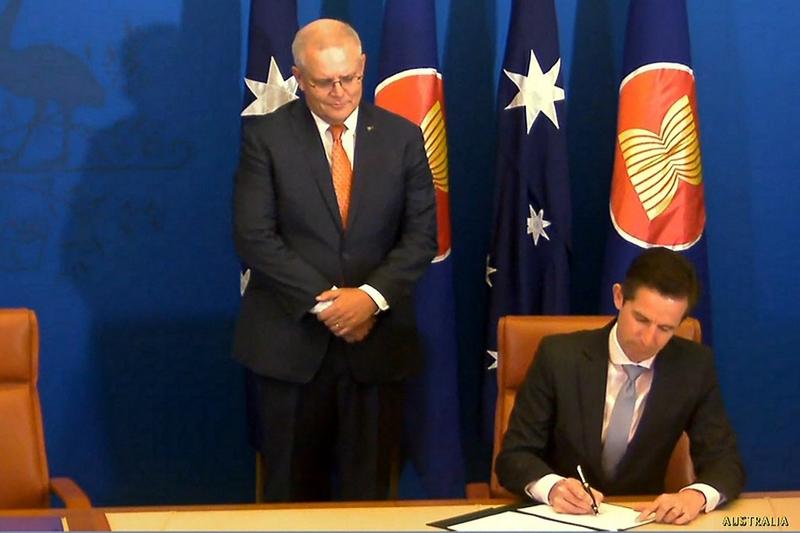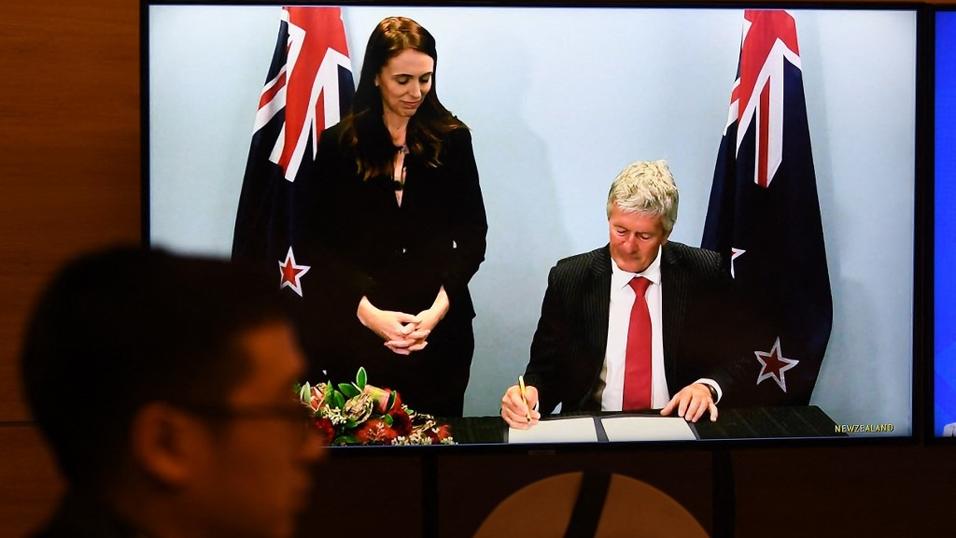 A screengrab taken from Vietnam Host Broadcaster's Nov 15, 2020 live video shows Australia's Prime Minister Scott Morrison (center) watching as Australia's Minister for Trade, Tourism and Investment Simon Birmingham signs the agreement during the signing ceremony for the Regional Comprehensive Economic Partnership (RCEP) trade pact at the ASEAN summit that is being held online in Hanoi. (HANDOUT / VIETNAM HOST BROADCASTER / AFP)
A screengrab taken from Vietnam Host Broadcaster's Nov 15, 2020 live video shows Australia's Prime Minister Scott Morrison (center) watching as Australia's Minister for Trade, Tourism and Investment Simon Birmingham signs the agreement during the signing ceremony for the Regional Comprehensive Economic Partnership (RCEP) trade pact at the ASEAN summit that is being held online in Hanoi. (HANDOUT / VIETNAM HOST BROADCASTER / AFP)
CANBERRA / WELLINGTON - Australia and New Zealand on Wednesday announced that they have ratified the Regional Comprehensive Economic Partnership agreement, which will take effect next year as the world's largest free trade agreement.
Australian Foreign Minister Marise Payne and Minister for Trade, Tourism and Investment Dan Tehan said in a statement that RCEP would be a major boost for the country's economy.
"Australia has ratified the Regional Comprehensive Economic Partnership Agreement, ensuring that our farmers and businesses are able to access the benefits of what will be the world's largest free trade agreement," according to the statement.
 In this file photo taken on Nov 15, 2020, New Zealand's Prime Minister Jacinda Ardern (center) looks on as New Zealand's Trade Minister Damien O'Connor (right) signs the agreement, as seen on a TV monitor, during the signing ceremony for the Regional Comprehensive Economic Partnership (RCEP) trade pact at the ASEAN summit that is being held online in Hanoi. (NHAC NGUYEN / AFP)
In this file photo taken on Nov 15, 2020, New Zealand's Prime Minister Jacinda Ardern (center) looks on as New Zealand's Trade Minister Damien O'Connor (right) signs the agreement, as seen on a TV monitor, during the signing ceremony for the Regional Comprehensive Economic Partnership (RCEP) trade pact at the ASEAN summit that is being held online in Hanoi. (NHAC NGUYEN / AFP)
New Zealand's Minister of State for Trade and Export Growth Phil Twyford noted that RCEP will unlock huge economic benefits for exporters and businesses, as well as new market access.
"For New Zealand exporters, businesses and investors this means: A single set of trade and investment rules across the entire RCEP region, increasing certainty and reducing complexity. The opportunity for our exporters to get their products into RCEP-wide regional value chains."
"More market access opportunities, especially for services and investment into China and some ASEAN member states. Less red tape for exporters, and more streamlined trade; and new rules on government procurement, competition policy and electronic commerce, which will help New Zealand exporters take advantage of increased business opportunities," Twyford said.
ALSO READ: RCEP signatories urged to ratify pact to speed up trade flow
"Our primary industries will also benefit - with the new expectation that customs authorities will release perishable goods within six hours of arrival, helping to reduce spoilage and save money," he said.
"This agreement will also enable our businesses to be better connected via regional supply chains and provide more certainty to exporters in what remain globally uncertain times."
Independent analysis by ImpactECON has shown that over a period of 20 years, New Zealand's annual GDP will be between 0.3 percent and 0.6 percent larger as a result of the agreement.
Signed in November last year, the RCEP is a mega trade deal between 10 Association of Southeast Asian Nations member states, namely Brunei, Cambodia, Indonesia, Laos, Malaysia, Myanmar, the Philippines, Singapore, Thailand and Vietnam, plus China, Japan, South Korea, Australia and New Zealand.
RCEP will enter into force 60 days after ratification by at least six ASEAN states and at least three non-ASEAN countries
RCEP will enter into force 60 days after ratification by at least six ASEAN states and at least three non-ASEAN countries.
"That milestone was reached on 2 November 2021 with ratification by Australia and New Zealand, which will pave the way for RCEP to enter into force on 1 January 2022," according to Australia's statement.
Once in effect, the deal will eliminate tariffs on as much as 90 percent of goods traded between its signatories over the next 20 years. RCEP will be a trade agreement between 15 economies in the region that is home to almost a third of the world's population, nearly a third of the world's GDP.


